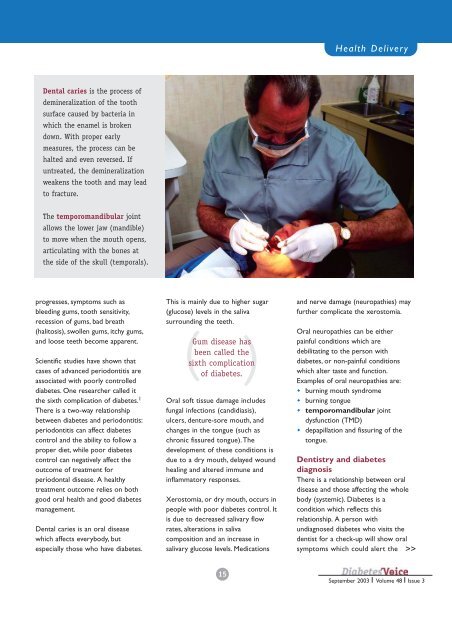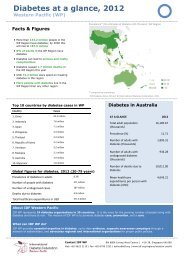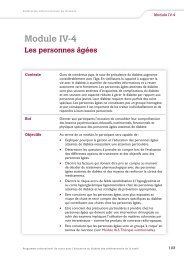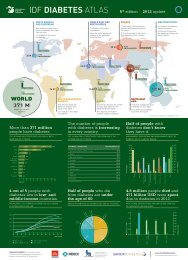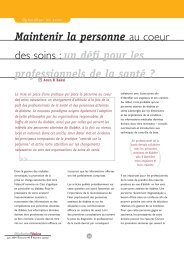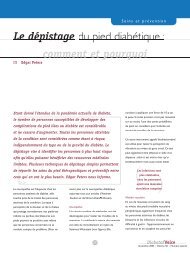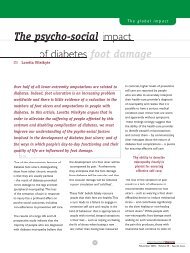Dentistry in diabetes diagnosis and management
Dentistry in diabetes diagnosis and management
Dentistry in diabetes diagnosis and management
Create successful ePaper yourself
Turn your PDF publications into a flip-book with our unique Google optimized e-Paper software.
Health Delivery<br />
Dental caries is the process of<br />
dem<strong>in</strong>eralization of the tooth<br />
surface caused by bacteria <strong>in</strong><br />
which the enamel is broken<br />
down. With proper early<br />
measures, the process can be<br />
halted <strong>and</strong> even reversed. If<br />
untreated, the dem<strong>in</strong>eralization<br />
weakens the tooth <strong>and</strong> may lead<br />
to fracture.<br />
The temporom<strong>and</strong>ibular jo<strong>in</strong>t<br />
allows the lower jaw (m<strong>and</strong>ible)<br />
to move when the mouth opens,<br />
articulat<strong>in</strong>g with the bones at<br />
the side of the skull (temporals).<br />
progresses, symptoms such as<br />
bleed<strong>in</strong>g gums, tooth sensitivity,<br />
recession of gums, bad breath<br />
(halitosis), swollen gums, itchy gums,<br />
<strong>and</strong> loose teeth become apparent.<br />
Scientific studies have shown that<br />
cases of advanced periodontitis are<br />
associated with poorly controlled<br />
<strong>diabetes</strong>. One researcher called it<br />
the sixth complication of <strong>diabetes</strong>. 1<br />
There is a two-way relationship<br />
between <strong>diabetes</strong> <strong>and</strong> periodontitis:<br />
periodontitis can affect <strong>diabetes</strong><br />
control <strong>and</strong> the ability to follow a<br />
proper diet, while poor <strong>diabetes</strong><br />
control can negatively affect the<br />
outcome of treatment for<br />
periodontal disease. A healthy<br />
treatment outcome relies on both<br />
good oral health <strong>and</strong> good <strong>diabetes</strong><br />
<strong>management</strong>.<br />
Dental caries is an oral disease<br />
which affects everybody, but<br />
especially those who have <strong>diabetes</strong>.<br />
This is ma<strong>in</strong>ly due to higher sugar<br />
(glucose) levels <strong>in</strong> the saliva<br />
surround<strong>in</strong>g the teeth.<br />
( )<br />
Gum disease has<br />
been called the<br />
sixth complication<br />
of <strong>diabetes</strong>.<br />
Oral soft tissue damage <strong>in</strong>cludes<br />
fungal <strong>in</strong>fections (c<strong>and</strong>idiasis),<br />
ulcers, denture-sore mouth, <strong>and</strong><br />
changes <strong>in</strong> the tongue (such as<br />
chronic fissured tongue).The<br />
development of these conditions is<br />
due to a dry mouth, delayed wound<br />
heal<strong>in</strong>g <strong>and</strong> altered immune <strong>and</strong><br />
<strong>in</strong>flammatory responses.<br />
Xerostomia, or dry mouth, occurs <strong>in</strong><br />
people with poor <strong>diabetes</strong> control. It<br />
is due to decreased salivary flow<br />
rates, alterations <strong>in</strong> saliva<br />
composition <strong>and</strong> an <strong>in</strong>crease <strong>in</strong><br />
salivary glucose levels. Medications<br />
<strong>and</strong> nerve damage (neuropathies) may<br />
further complicate the xerostomia.<br />
Oral neuropathies can be either<br />
pa<strong>in</strong>ful conditions which are<br />
debilitat<strong>in</strong>g to the person with<br />
<strong>diabetes</strong>, or non-pa<strong>in</strong>ful conditions<br />
which alter taste <strong>and</strong> function.<br />
Examples of oral neuropathies are:<br />
• burn<strong>in</strong>g mouth syndrome<br />
• burn<strong>in</strong>g tongue<br />
• temporom<strong>and</strong>ibular jo<strong>in</strong>t<br />
dysfunction (TMD)<br />
• depapillation <strong>and</strong> fissur<strong>in</strong>g of the<br />
tongue.<br />
<strong>Dentistry</strong> <strong>and</strong> <strong>diabetes</strong><br />
<strong>diagnosis</strong><br />
There is a relationship between oral<br />
disease <strong>and</strong> those affect<strong>in</strong>g the whole<br />
body (systemic). Diabetes is a<br />
condition which reflects this<br />
relationship. A person with<br />
undiagnosed <strong>diabetes</strong> who visits the<br />
dentist for a check-up will show oral<br />
symptoms which could alert the >><br />
15<br />
September 2003 Volume 48 Issue 3


